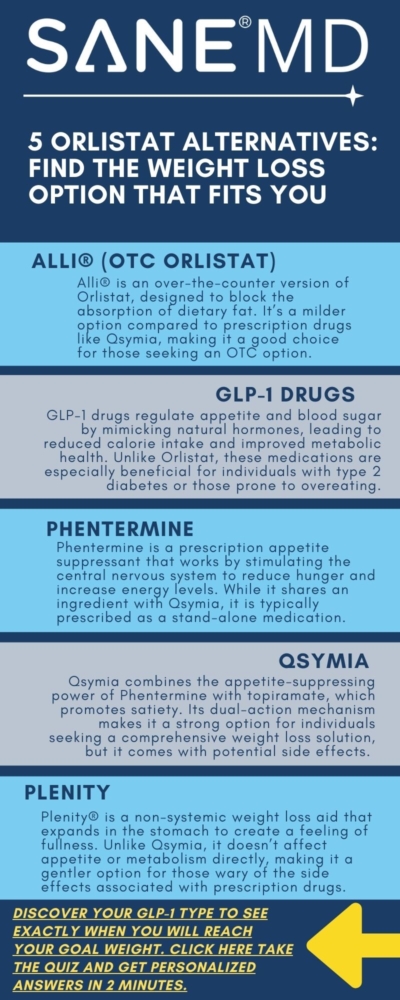5 Orlistat Alternatives: Find Your Weight Loss Drug + Quiz
Dr. Matthew Olesiak, MD, is the Chief Medical Director at SANESolution, a renowned wellness technology company dedicated to providing evidence-based solutions for optimal living. Dr. Olesiak earned his medical degree from the prestigious Jagiellonian University Medical College in Kraków, Poland, where he developed a strong foundation in medicine.
Orlistat stands out in the world of weight loss medications due to its unique fat-blocking mechanism. Unlike other prescription weight loss drugs, Orlistat works by preventing the absorption of about 25% of dietary fat in the digestive system, making it a popular choice for individuals with high-fat diets.
However, it’s not the only option. For those questioning and seeking effective Orlistat alternatives, there are weight loss medications that work through different mechanisms to help you lose weight, such as regulating appetite, boosting metabolism, or enhancing feelings of fullness.
These Orlistat alternatives may be better suited to individuals with varying weight loss needs or specific health considerations. Exploring these options is crucial because weight loss is never a one-size-fits-all journey.
Understanding how these drugs compare to Orlistat can help you make informed decisions about the path that’s right for you. Plus, taking our weight loss drug type quiz can point you toward an option tailored to your personal goals and health needs.
Key Takeaways
- Orlistat’s fat-blocking mechanism makes it a unique option for weight loss.
- Alternatives offer varied mechanisms and may better suit individual preferences or health needs.
- Consult a healthcare provider to explore weight loss medications tailored to your goals and circumstances.
What Makes Orlistat Unique?
Orlistat is a standout in the realm of weight loss medications, primarily due to its distinctive fat-blocking mechanism. Unlike other drugs that focus on suppressing appetite or boosting metabolism, Orlistat works directly in the digestive tract to prevent the absorption of dietary fat.
By inhibiting the enzyme lipase, Orlistat stops about 25% of the fat you consume from being broken down and absorbed into your body. Instead, this fat is eliminated through your stool, reducing the overall calorie intake and aiding in weight loss.
This unique mechanism makes Orlistat particularly effective for individuals with diets high in fat. If your meals often include rich or greasy foods, Orlistat may help mitigate the caloric impact of those choices. However, its effectiveness hinges on adhering to a reduced-calorie, low-fat diet.
Consuming too much fat while taking Orlistat can lead to uncomfortable side effects, underscoring the importance of dietary adjustments when using this medication.
Speaking of side effects, Orlistat’s fat-blocking properties come with a set of challenges that users must consider. The most common side effects include gastrointestinal discomfort, such as oily stools, frequent bowel movements, and occasional abdominal cramping.
These effects occur because undigested fat passes through the digestive system, which can be unpleasant for some individuals. Additionally, Orlistat may interfere with the absorption of fat-soluble vitamins like A, D, E, and K, making supplementation necessary for those taking the medication long-term.
While Orlistat’s mechanism is unique and effective for many, it’s not a universal solution. Some individuals may find its side effects inconvenient or its dietary restrictions difficult to maintain. For those seeking a weight loss medication with a different approach, exploring Orlistat alternatives can provide options better aligned with personal preferences and health needs.
Understanding what makes Orlistat unique helps highlight its strengths and limitations.
As always, consulting with a healthcare provider is essential to determine whether this medication—or an alternative—is the right fit for your weight loss journey.

5 Alternatives to Orlistat
When Orlistat’s fat-blocking mechanism or cost isn’t the right fit, these alternatives offer unique approaches to weight loss. Each works differently, catering to varied needs and preferences.
1. Alli® (Over-the-Counter Orlistat)
Alli® is essentially Orlistat in a lower dose, available without a prescription. Like Orlistat, it blocks about 25% of dietary fat from being absorbed, making it a convenient option for those who prefer over-the-counter solutions. Alli is most effective for individuals who are already committed to a low-fat diet and a consistent exercise routine.
However, the reduced dose means its effects may be less pronounced than prescription-strength Orlistat, so it’s best suited for those with moderate weight loss goals.
2. GLP-1 Drugs (Wegovy®, Saxenda®)
GLP-1 drugs like Ozempic, Wegovy® and Saxenda® are some of the prescription weight loss medications that take a completely different approach from Orlistat. These medications function by imitating the hormone GLP-1, which plays a role in controlling appetite and managing blood sugar levels.
By slowing gastric emptying and enhancing feelings of fullness, GLP-1 drugs can reduce calorie intake significantly. They also offer metabolic benefits, particularly for individuals with conditions like prediabetes or type 2 diabetes. (Type 2 diabetes is one of the most common digestive and kidney diseases in the world.) GLP-1 drugs are commonly used for chronic weight management.
Unlike Orlistat, which targets dietary fat, GLP-1 drugs focus on appetite suppression and blood sugar control. While their efficacy is notable, they require injections and are typically more expensive.
They may be a better choice for those who struggle with overeating or who seek benefits beyond reduced body weight.
3. Phentermine
Phentermine is a prescription medication designed to suppress appetite by triggering the release of brain chemicals that help reduce hunger and boost energy levels. Unlike Orlistat, which acts in the digestive tract, Phentermine directly impacts the central nervous system.
It’s often prescribed for short-term use in individuals with a body mass index (BMI) over 30 or those with weight-related conditions. (It has also been used to help treat depression).
While Phentermine can lead to rapid initial weight loss, it’s not without risks. Potential side effects include increased heart rate, anxiety, and insomnia. Its stimulant-like nature makes it unsuitable for individuals with certain health conditions, but it remains a popular choice for those needing a quick metabolic boost.
4. Qsymia®
Qsymia® combines Phentermine with topiramate, a medication initially developed for migraines and seizures. This combination enhances appetite suppression while promoting satiety, making it a dual-action weight loss solution.
Qsymia may appeal to individuals seeking a more robust approach than Orlistat, but it comes with its own considerations. Like many prescription drugs, side effects such as dry mouth, dizziness, and mood changes are possible.
Additionally, its use is restricted for pregnant women and individuals with certain medical histories, emphasizing the need for professional guidance when considering this alternative.
5. Plenity®
Plenity® is a non-systemic weight loss aid that works by creating a feeling of fullness before meals. Taken as a capsule with water, it expands in the stomach, reducing hunger and calorie intake. Unlike Orlistat, Plenity does not interfere with fat digestion, making it a gentler option for the digestive system.
Beyond weight loss, Plenity offers potential gut health benefits, as its gel-like structure may promote better digestion and regularity. For individuals wary of Orlistat’s side effects or dietary restrictions, Plenitycan help treat obesity by providing a non-invasive, flexible alternative.
These Orlistat alternatives demonstrate the diversity of weight loss medications, each offering unique benefits. To discover which might suit you best, take our weight loss drug type quiz and consult your healthcare provider.
FAQs About Orlistat Alternatives
When considering weight loss medications, questions about their effectiveness, differences, and suitability often arise. Orlistat is well-known for its fat-blocking properties, but alternatives like Alli®, GLP-1 drugs, and others offer distinct benefits.
Below, we address common questions to help you understand how these options compare and determine which might be the right fit for your weight loss journey.
1. What can I take instead of Orlistat?
There are several alternatives to Orlistat, each working through different mechanisms. For instance, GLP-1 drugs like Wegovy® or Saxenda® suppress appetite and regulate blood sugar, making them suitable for those who struggle with overeating.
Phentermine and Qsymia® are prescription options that enhance metabolism and curb hunger, while Plenity® offers a non-systemic approach by creating a feeling of fullness.
The best alternative depends on your weight loss goals, lifestyle, and any underlying health conditions. Consult your healthcare provider to determine the most appropriate option for you.
2. What is the over-the-counter version of Orlistat?
Alli® is the over-the-counter version of Orlistat. It contains the same active ingredient but at a lower dose, making it accessible without a prescription.
Alli® works similarly by blocking the absorption of dietary fat, but users must still adhere to a reduced-calorie, low-fat diet to minimize side effects like oily stools.
While it’s less potent than prescription-strength Orlistat, Alli® is a convenient option for individuals seeking moderate weight loss.
3. What is more effective than Orlistat?
The effectiveness of a weight loss medication depends on individual needs and health profiles. GLP-1 drugs like Wegovy® and Saxenda® are often considered more effective than Orlistat for overall weight loss because they target appetite regulation and offer metabolic benefits.
Similarly, combination medications like Qsymia® may provide more significant results for individuals requiring a multifaceted approach. However, effectiveness varies, so it’s essential to weigh the benefits and risks of each option with your healthcare provider.
4. Is Ozempic the same as Orlistat?
No, Ozempic is not the same as Orlistat. While Orlistat focuses on blocking fat absorption in the digestive system, Ozempic belongs to the GLP-1 drug class, which works by regulating appetite and blood sugar.
Ozempic is typically prescribed for individuals with type 2 diabetes. However, it is often prescribed off-label as an obesity treatment for those seeking significant weight loss through appetite suppression. Both medications have distinct mechanisms of action, and your healthcare provider can help determine which is more suitable for your needs.
5. Are there natural alternatives to Orlistat?
Natural alternatives to Orlistat include dietary adjustments and supplements that promote weight loss.
Increasing your intake of fiber-rich foods, like vegetables, fruits, and legumes, can help reduce calorie absorption and improve satiety. The resulting weight loss can also help moderate high blood pressure.
Certain natural supplements, such as green tea extract or glucomannan, may also support weight management by boosting metabolism or creating a feeling of fullness.
However, natural options may not provide results as significant as medications, so consult a healthcare provider to develop a comprehensive weight loss plan.
Conclusion
Understanding how different weight loss drugs work is essential for making informed decisions about your health and wellness journey.
Orlistat’s fat-blocking mechanism is unique and highly effective for individuals with specific dietary needs, but it’s not the only option.
Exploring alternatives such as GLP-1 drugs, Phentermine, Qsymia®, and Plenity® can provide pathways that align better with your weight loss goals, lifestyle, and health conditions.
Each of these medications serves a unique purpose and can deliver effective results, helping to promote weight loss and prevent weight gain, when used correctly and under the guidance of a healthcare provider.
Whether you choose Orlistat or an alternative, the key is finding a solution that fits your individual needs.
To explore your options further and identify the best fit, consider taking our weight loss drug type quiz and discussing your results with a medical professional.




